Salivary Gland Cancer Specialist in Mumbai
Are you or a loved one diagnosed with salivary gland cancer? Are you searching for the right salivary gland cancer specialist in Mumbai? Dr. Devendra Chaukar can help you navigate this challenging journey. He is a highly recognized head and neck oncologist in Mumbai with over 20 years of experience. Dr. Chaukar has immense expertise in treating salivary gland cancer patients. He provides innovative treatments tailored to each patient’s needs and strives to offer the best possible care.
Take the first step towards renewed health! Schedule a consultation with Dr. Devendra
Are you aware of the nuances of salivary gland cancer? Let’s delve into the details.
Overview of Salivary Gland Cancer
Salivary gland cancer, also known as salivary gland carcinoma, is a rare but severe health concern. It accounts for about 5-10% of all head and neck cancers in India. Globally, it represents less than 1% of all cancers. This cancer originates in the salivary glands, which produce saliva in the mouth. The most common subtype is mucoepidermoid carcinoma. It constitutes about 30% of cases.
Carcinoma of salivary gland can impair a patient’s ability to eat, speak and breathe comfortably. It can occur at any age but is more common in people over 50. The exact cause of this condition is still unknown. However, factors such as exposure to radiation, smoking, and specific genetic mutations are considered contributing factors.
Early detection is essential for successful treatment. Regular check-ups and awareness can help identify the condition in its early stages. This can improve the chances of recovery.
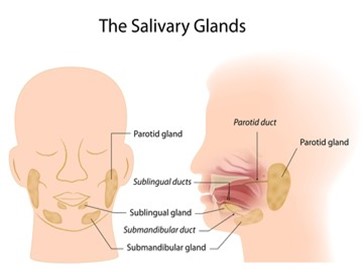
Consult a seasoned head and neck specialist to assess your suitability.
Meet Dr. Devendra Chaukar, a competent salivary gland cancer specialist in Mumbai. Discover his unparalleled expertise and innovative treatment approaches.
More About Dr. Devendra Chaukar
Dr. Devendra Chaukar is a highly recognised head and neck oncologist in Mumbai with over two decades of experience. Dr. Chaukar specializes in diagnosing and surgically treating salivary gland cancers with precision. He is well-known for his expertise in minimally invasive surgical techniques, such as laser and robotic cancer surgeries.
These innovative methods provide greater accuracy and promote faster recovery, crucial in treating salivary gland cancers. Dr. Chaukar’s meticulous approach prioritizes restoring functionality while minimizing risks to patients. This offers hope to patients in their fight against this challenging disease.
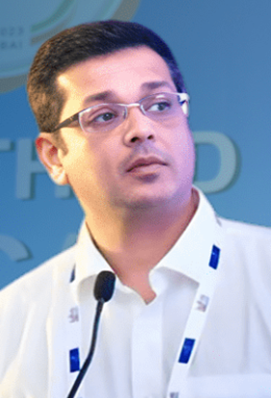
Take the first step towards healing. Book your appointment with a highly skilled head and neck oncologist today.
Now, let’s discuss the different types of salivary gland cancers and their characteristics.
Types of Salivary Gland Cancers
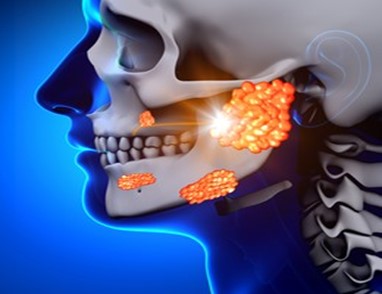
Types of Salivary Gland Cancers
Mucoepidermoid carcinoma:
It is the most common salivary gland carcinoma, developing in the parotid glands. The parotid gland is the largest salivary gland located near the ears. Hence, they are also known as parotid gland tumors. They can also develop in the major and minor salivary glands. It often appears as a painless mass.
Adenoidcystic carcinoma:
It is the most common type of minor salivary gland and submandibular gland cancer. Known for its slow growth, it tends to invade nerves. This makes complete removal challenging.
Acinic cell carcinoma:
It is characterized by abnormal growth of acinar cells. These cells are responsible for producing saliva. This salivary glandular cancer typically presents as a slow-growing tumor. Often, it is found in the parotid gland. But it can occur in other salivary glands as well. These types of tumors account for 2% to 5% of the primary neoplasm of parotid gland.
Salivary duct cancer:
It develops in the ducts that carry saliva from the salivary glands to the mouth. It often appears as a painless mass near the jawline, ear, or mouth. This cancer is known for its aggressive nature. It can quickly spread to nearby tissues and lymph nodes.
Polymorphous low-grade adenocarcinoma:
It typically occurs in the minor salivary glands in the mouth and throat. This cancer grows slowly and tends to spread along nerve pathways. Sometimes, it can recur or metastasize.
Connect with experts for post-operative support and guidance.
Early detection can make all the difference in battling salivary gland cancer. Learn why specialized care is crucial for optimal outcomes.
Importance of Early Detection and Specialized Care
“Early detection and specialized care are paramount in combating salivary gland cancer,” says Dr. Devendra Chaukar, an esteemed salivary gland cancer specialist in Mumbai. He emphasizes the crucial role of timely identification in enhancing treatment outcomes.
“We can swiftly implement tailored interventions by detecting the cancer in its early stages. This could prevent its progression and improve prognosis”, explains Dr. Chaukar.
Dr. Devendra Chaukar helps patients by providing proactive screening and a comprehensive understanding of the disease. He empowers them with knowledge and resources to confront the illness successfully. His approach underscores the significance of personalized care. He ensures each patient receives targeted treatments tailored to their unique needs.

Uncover the diagnostic process for salivary glandular cancer. From imaging tests to biopsies, learn how we identify and confirm this condition.
Diagnosis of Salivary Gland Cancer

Salivary gland cancer diagnosis typically begins with a thorough medical history and physical examination.

Your doctor may order imaging tests such as CT, MRI, or ultrasound scans. These scans help visualize the tumor and determine its size and location.

A biopsy is often necessary to confirm the diagnosis of salivary gland cancer. It involves examining the tissue sample of the affected area under a microscope. Biopsy helps confirm the presence of cancerous cells.

Other tests, such as blood tests and PET scans, may be conducted. They assess the extent of the cancer and whether it has spread to other body parts.
Once the diagnosis is confirmed, further evaluation by a multidisciplinary team, including oncologists, surgeons, and pathologists, helps determine the most appropriate treatment plan.
Ready to take proactive steps towards your health? Schedule a screening with us today and prioritize early detection.
Now, let’s explore various treatment options for salivary gland cancer. From surgery to targeted therapies, we tailor solutions to your unique needs.
Treatments for Salivary Gland Cancer
- Surgery:
Surgery is the primary treatment for salivary gland cancer. It involves removing the tumor and surrounding tissue to ensure complete eradication.
Dr. Devendra Chaukar is a distinguished salivary gland cancer specialist in Mumbai. He is well-versed in conventional and minimally invasive cancer surgeries. Dr. Chaukar may recommend the below surgeries to manage salivary gland cancer:
- Parotidectomy:
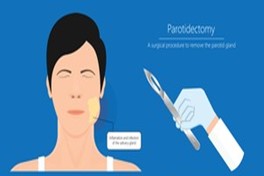
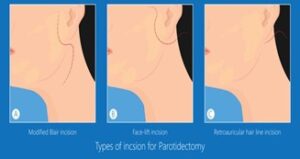
This surgery involves removing part or all of the parotid gland where most salivary gland cancers occur. It aims to eliminate cancerous cells while preserving facial nerves for optimal function and appearance.
- Submandibular Gland Excision:
In cases of submandibular gland cancer, the surgeon performs this surgery to remove the affected gland. This ensures complete cancer removal. It minimizes damage to nearby tissues and structures.
- Neck Dissection:
Surgeons perform this procedure when cancer has spread to nearby lymph nodes. This surgery involves removing affected nodes. It reduces the risk of cancer recurrence and improves overall prognosis.
- Transoral Robotic Surgery (TORS):
TORS is a minimally invasive approach for tumors located within the mouth or throat. It offers precise tumor removal with reduced postoperative complications and faster recovery times.
- Facial Nerve Reconstruction:
If cancer involves the facial nerve, specialized surgical techniques are employed to reconstruct and restore nerve function. It helps maintain facial expression and symmetry post-surgery.
- Radiation Therapy:

Radiation therapy targets cancer cells using high-energy radiation. It destroys any remaining cancer cells post-surgery or as the primary treatment for inoperable tumors. It involves advanced techniques, such as:
- External-beam radiation therapy
- Fast neutron radiation therapy
- Photon-beam radiation therapy
3. Chemotherapy:

Chemotherapy is often combined with radiation therapy for advanced cases. It involves targeting cancer cells throughout the body. This systemic approach can be a vital part of your treatment plan.
- Targeted Therapy:
It utilizes drugs or other substances to attack cancer cells while minimizing damage to healthy tissue specifically.
- Immunotherapy:
It boosts the immune system to recognize and destroy cancer cells. It offers promising results in some instances.
- Palliative Care:
Focuses on improving quality of life through pain management and symptom relief. It is mainly for advanced or metastatic cases.
Let’s discuss about the success rate of salivary glandular cancer treatment.
Success Rate for Salivary Gland Cancer
Salivary gland cancer success rates vary based on several factors. These include the stage of cancer, overall health, and treatment approach. Early detection and prompt intervention significantly improve outcomes.
In general, localized tumors have higher success rates compared to advanced stages. Treatment modalities like surgery, radiation therapy, and chemotherapy play pivotal roles. Surgical removal often leads to excellent outcomes, particularly in the early stages. Radiation therapy and chemotherapy may also be effective, depending on the cancer’s characteristics.
Regular screenings and prompt treatment consultations with a trusted salivary gland cancer specialist in Mumbai, like Dr. Devendra Chaukar, ensure optimal outcomes. It offers hope and reassurance on your journey to recovery. Regular follow-ups post-treatment aid in monitoring and managing any potential recurrence. It ensures sustained success in battling salivary gland cancer.
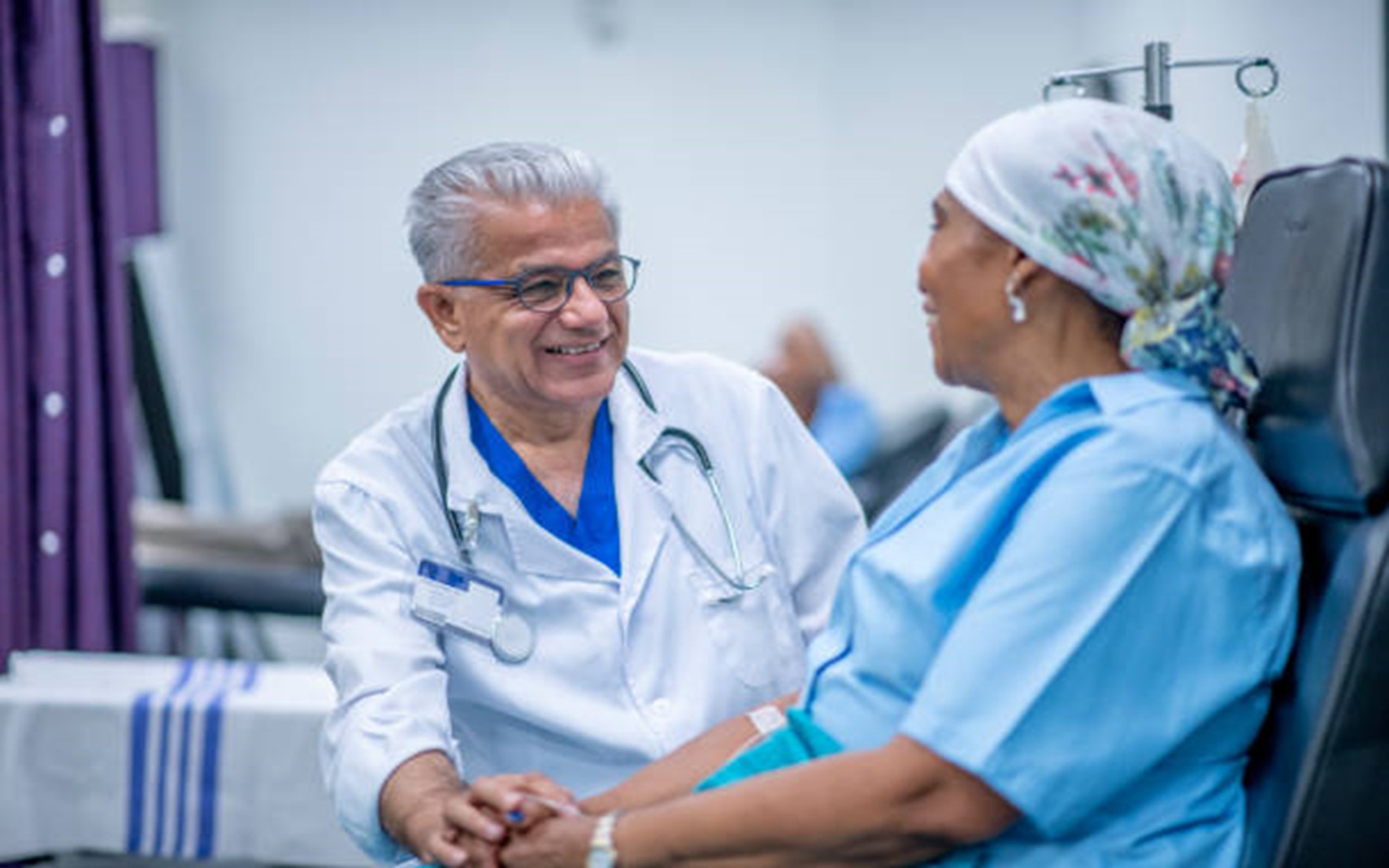
Real-life scenarios illuminate the path to recovery. Dive into a compelling case study showcasing triumph over adversity.
Case Study
- Patient Name: Kranti Patwardhan
- Diagnosis:
Kranti Patwardhan, a 45-year-old woman, was diagnosed with salivary gland cancer. She had persistent swelling and pain in her jaw. Dr. Devendra Chaukar confirmed the diagnosis following diagnostic tests, including imaging and biopsy.
- Treatment:
Dr. Chaukar recommended a tailored treatment plan for Kranti. It comprised surgery to remove the cancerous tumor. Then, radiation therapy was used to ensure comprehensive eradication of cancer cells. Throughout the treatment process, Dr. Chaukar provided personalized care and support. He addressed the patient’s concerns with empathy and expertise.
- Outcomes:
The patient responded well to the treatment regimen prescribed by Dr. Chaukar. The surgery successfully removed the tumor. Subsequent radiation therapy effectively targeted any remaining cancer cells.
Regular follow-up appointments with Dr. Chaukar ensured that Kranti’s recovery progressed smoothly. Today, Kranti is grateful for Dr. Chaukar’s skilful intervention. She is enjoying a cancer-free life filled with hope and renewed vitality.
Don’t just take our word for it! Hear from those who have walked the path of recovery under Dr. Devendra’s care.
Google Testimonials
Get answers to common queries on salivary gland cancer and its treatment options.
Frequently Asked Questions
How long does treatment for salivary gland cancer typically last?
Treatment duration varies depending on the stage and type of cancer. But it may span several weeks to months.
What are the side effects of salivary gland cancer treatment?
Side effects may include fatigue, nausea, hair loss, and changes in taste or saliva production.
Can salivary gland cancer spread to other parts of the body?
It can metastasize to nearby lymph nodes or distant organs if left untreated.
What can I expect during recovery from salivary gland cancer treatment?
Recovery involves regular follow-ups, monitoring for recurrence, and addressing any lingering side effects.
Is genetic testing recommended for salivary gland cancer patients?
Sometimes, genetic testing may be recommended to assess inherited risk factors or guide treatment decisions.
Can salivary gland cancer recur after treatment?
Yes, salivary gland cancer can recur. Hence, regular follow-ups and monitoring are crucial for effective management.
Reference links:
https://www.cancerresearchuk.org/about-cancer/salivary-gland-cancer




